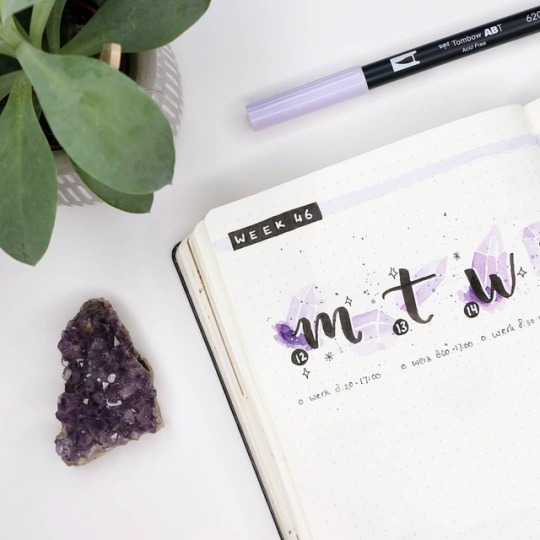Photo
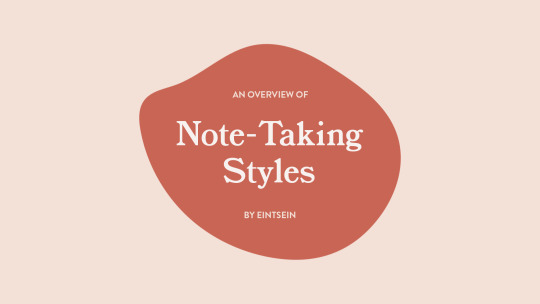

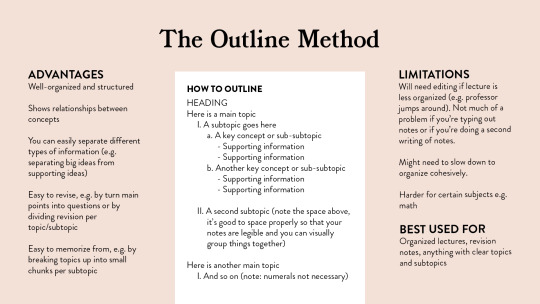
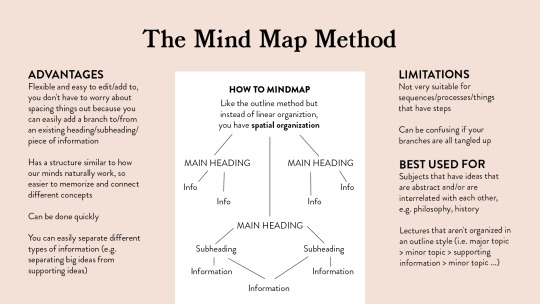

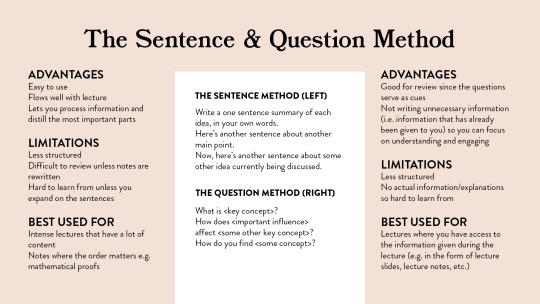
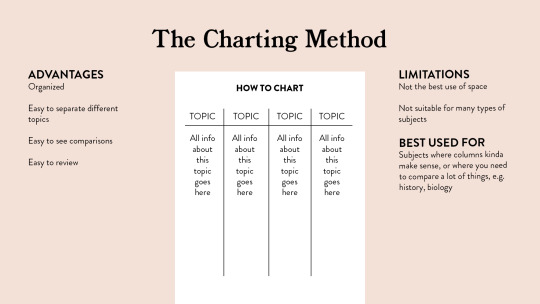


An Overview of Note-Taking Styles
Note-taking is one of the most essential skills a student should master. It allows you to record and review information to be used in the future. But what’s the best way to do so? Here’s an overview of note-taking styles that can help you maximize your learning!
56K notes
·
View notes
Text

I was talking to my friend about my essay planning process and surprised them with my method - I thought this was the most common way to plan essays and it’s something I find really useful so I decided to share it in case it’s helpful, even though it’s probably not new knowledge!
What kind of essays can I use this for?
I use this for all my essays, though they tend to range from 1000-3000 words
I have yet to use it for a dissertation length essay but I’ll probably use the same structure, just much more detailed
This method is one that really helps me for essays I’m dreading writing or don’t know where to begin, because it breaks it down and makes it more manageable
May be different for different subjects - I use this predominantly for philosophy essays, which it works really well for
Where to start? (At the beginning and the end!)
Start with your word count. For example, let’s say your word count was 2000 words
Your introduction and conclusion should be no more than 10% of your essay
In our example, 10% of 2000 is 200 words, so:
100 words introduction
100 words conclusion
Onto the main body!
We’ve started to break it down! Subtract that from your desired word count and that’s your writing room for the main points of your essay
In our example that leaves you with 1800 words
Now you need to work out roughly how many words you make a point in - which really isn’t an exact science
For me I make a point in about 150-350 words, it really depends on how much detail you have to include
If you’re unsure write a rough draft of a point or analyse some of your previous essays - this word count usually includes referencing and quotations
For the sake of our example let’s say each point is about 250 words
250 goes into 1800 7 times, with 50 words for some leeway.
That means roughly you will need 7 points to make up your essay.
You can play around with what works for you - if 7 is too many, or perhaps you want an even number of points you can tailor it for that particular essay
Maybe one point will be 500 words instead because you have the most to say about them - whatever works for you is fine.
The emphasis here is on approximation, don’t get too hung up on meeting exact word counts, write what you have first and if you need more, find some detail to add to your points
Here’s the part about this way of planning essays that soothes me - looking at a blank pages and knowing you have to write 2000 words is very daunting. Instead, once I’ve broken it down like this I know I’ll need 5-7 points on a subject I’ve been studying, which is something I know I’m capable of -
“But Ceri?” I hear you ask. “What if I can’t think of enough points?”
This is part two of my essay plan - done with the statistics, you need the content
Analyse your question or title, this is the most important bit.
What is the question asking of you? Does it want an argument? An explanation? What things do you need to include?
Once you have a clear idea of what they want, whether you have an idea or not of what to write, look over your notes
Every essay needs evidence, something to support what you’re saying, be it data or critics or theorists - my advice is to find the evidence that is there and build your points around it
When you need to argue to your conclusion look for evidence that opposes each other, and that’s two points already done
Start by writing your essay in bullet points, then in longer sentences while you shift things around and then finally go full essay format
As you write other points or things to include might come to you - be sure you make a note of them!
One final tip - reference as you go along. It’s such a pain but getting to the end of an essay is a marathon, and then having to go through and sort out your referencing is like a sprint for the end
Anyway that’s most of my help for now! You might read this and think that none of it will work for you, and that’s fine too, there isn’t one set way to write an essay and this is by no means the best way - just my way.
It’s probably nothing new to most of you but I’m happy to share just in case, feel free to drop by and ask anything!
887 notes
·
View notes
Photo

11.12.18 // 10:00 am
some chemistry notes I took in preparation for the chemistry subject test over the summer
BTW I need some help in deciding how I wanna take this account, so I created a little survey and it would mean a lot to me if you took a few minutes to complete it :) link is here
studygram
3K notes
·
View notes
Text
Studio access is so limited 😭 I just want to get my homework done

Two layers of my first screenprint done and two more to go
27 notes
·
View notes
Text
studybroe’s study tip #8
How I deal with procrastination that just comes from being lazy/not feeling it!
This is a really apt post for me right now, because I am currently going through a productivity slump, but I’ve had these countless times and I always manage to get back on track. Hopefully these can help you guys (and me lol)!
1. Make a list of the things you have to do
I find that making a list of all the things you have to do helps to a) lay out everything that you have to do so you can plan your time accordingly e.g. finish those that are more important first and b) stress you out a bit so you realise wow i have so many things to do i better get started
Try to make your to-do list as detailed as possible. I like to break my to dos into tiny tasks. For example, let’s say I’m doing a research essay, I could put “Write intro” and “Write body paragraph″ and “Write conclusion” as separate to dos, just so I can tick them off. I think it makes me feel like I’m being productive, which makes me happy and makes me want to be even more productive!
2. Plan your day
I swear this works: Plan the actual day you end your non-productiveness. For me, procrastination always comes in waves and I spend a few days not doing anything. To end the procrastination streak, I plan the exact day that I stop procrastinating and start being productive (which for me, it’s TOMORROW, wish me luck lol).
The night before, I plan what I’m gonna do, where I’m gonna do it, and sometimes the time I do it (especially if I plan to do revision, where it could be non-stop, unlike assignments which you might not know how long it’ll take). Remember to plan breaks in between as well if you know you can get tired easily!
I always make sure to write down my plans, because I think writing down things tends to compel me to actually go through with things since it seems almost like a contract. Typing things on my phone or laptop takes away the determination to go through with things, for me at least!
The most important day to be productive in the first day where you start getting back into the swing of things, which is why I think it’s very crucial to plan this first day. Once you feel like you’ve been sufficiently productive on the first day, it would be much easier to be productive for the days following.
3. Get yourself into an environment in which you know will force you to be productive
This really depends on each individual, but here are some of my own tried-and-tested things I do to make sure I do things:
Put on makeup and dress up. It makes me feel like I have to do something productive since I took the trouble to make myself look good.
Go outside to study. Staying at home works for me only when I know I’m in a productive mood, and when I’m in procrastination mode, it just entices me to watch Netflix. Going outside to a starbucks or a cafe makes me feel like I have to be productive or the money I spent to buy a drink and the time it took to get out of the house would be wasted.
Study with people you know can get you into the study mode, or at least not distract you from it. If not, just go yourself. I have a certain group of friends that I know I can study with and I would never get distracted by them, so I’ll hit them up and see if they wanna study together. If not, then I’d go by myself. No company is better than bad company!
Study at a place you know you like. Don’t go to a place where most people go to study, like the library or a starbucks, if it doesn’t work for you. For example, I can’t stand studying at public libraries because I think they’re too quiet for me, and I hate studying at certain starbucks because I don’t like the vibe! Of course, knowing which study spots are the best for you takes a bit of trial-and-error, but find out which is the place you can concentrate the best at, and stick to it!
4. Tell everybody about your plans, and tell everyone once you’ve went through with them!
Okay, this might be a bit irritating to some people, but just don’t be pompous about it and it should be fine. I make sure that I tell as many people as I can about my plans, and when I actually successfully go through with them, I’ll tell people too.
I think telling people your plans adds to the pressure to be productive, and it just kind of solidifies the promise you make to yourself to finish whatever that you need to. It’s just too easy to give up when only you know what you were supposed to do! And telling others about your success just makes the pleasure of doing something productive even better, so it’ll be even easier to continue being so. Celebrating the tiny achievements you have, like completing one task on your to do list, makes being productive not seem so daunting.
Usually, I tell my mama and my sister about what plans I have and what I managed to finish. I also post it on my main Instastory so I feel obligated to do it, and really, really satisfied once I’m done.
If you feel like people might think you’re obnoxious for rubbing your productivity in people’s faces, or that you might seem boastful, you could just private Snapchat or Insta DM it to your closer friends, or post it on a private/second account (if you have one!) You could create a study instagram or tumblr account too, which was one of the reasons why I created mine!
You guys could also totally message me on my Instagram or on this account if you want to share what you’ve done, or if you want me to remind you to/make sure you finish your to do list!! I’m actually really open to that, so don’t be shy!
Okay wow, I didn’t expect this post to be so long, but I really hope it helps! Tell me if these tips and tricks work out for you!
Leave a comment, ask or a PM, I’d love to hear from you!
Follow my instagram @studybroe!
769 notes
·
View notes
Photo

Notetaking
Sound Note - take notes while you record audio
Evernote - notetaking that syncs across platforms
Paper 53 - minimal notetaking that syncs
Microsoft OneNote - collaboration and syncing, best for Office users
Google Keep - jot things down, best for Google suite users
Notability - take notes and annotate PDFs
Mindly - create mind maps
Day One - a digital journal
Flash Cards
Quizlet - the quintessential flash card app
StudyBlue - another commonly used app
Cram - best for its “cram mode”
Eidetic - uses spaced repetition for effective memorization
Planner
My Study Life - schedules, tasks, reminders, and more
StudyCal - keeps track of tasks, exams, and grades
24me - automated reminders and event planning
iStudiez - schedule and prioritized task list
Google Calendar - a calendar, best for Google users
Glass Planner - a calendar and to do list with incredible functionality
To Do List
Clear - organized to-do and reminders
MinimaList - simple to-do and focus timer
Trello - collaborative project organizer
Todoist - clean and functional task manager
Default notes app on your phone
Time Management
Forest - plant trees by staying focused
Pomotodo - pomodoro timer with to-do list
Timeglass - custom timers
Tide - pomodoro with white noise
Alarmy - forces you out of bed
Pillow - smart alarm that tracks sleep cycles
Productivity
Workflow - automate tasks
Habitica - turn your habits into an RPG
Continuo - simple, colorful activity tracking
Freedom - block distracting apps
Free Learning
Coursera - free MOOCs
TED - listen to Ted Talks
Duolingo - language learning
Memrise - spaced repetition language vocabulary
Khan Academy - free video lessons
Ambient Noise
8tracks - curated playlists
Spotify - online music streaming
Coffitivity - cafe ambience
Noisli - background sound generator
Rain Rain - rain sounds
Binaural - binaural beats
Health
Rockin Ramen - recipes based on ramen
MealBoard - meal planning
Lifesum - healthy eating
Stop Breath And Think - mindfulness meditation
Pacifica - mental health management
Sworkit - personalized video workouts
Waterlogged - hydration tracker
Reference
WolframAlpha - Google on steroids
Oxford Dictionary - all of English at your fingertips
RefMe - citation generator
PhotoMath - solve math problems by taking a photo
Mathway - step by step math help
Desmos - free graphing calculator
Wikipedia - not the best source, but it’s handy
Miscellaneous
Companion - stay safe when walking alone
Mint - money management
Toshl - finance manager
Tiny Scanner - scan documents
90K notes
·
View notes
Text
five tips for study marathons
In Belgium we have this thing called ‘blok’. It’s the name for the two to three weeks of marathon studying between the end of classes and the start of exams, related to the verb ‘blokken’, which basically means ‘hardcore studying’. It’s obviously not a very pleasant time, so here are some tips to survive those study marathons!
1. Hydrate. Of course has been said again and again, but that’s because it’s so important! I usually get myself either a half-liter pint and a (reusable!) straw. Straws really help me to drink more, but they’re not very good for the environment, so if you can get your hands on a reusable one, go for it! You can also try adding fruit to your water for some extra flavour.
2. Breathe ouside air at least once a day. I don’t care how you do it. Take a walk at noon, go on a morning run, breathe really deep when you’re in line for the library, stick your head out of a window, I don’t care. Just do it. You need the oxygen and it’s not good to sit inside all day.
3. Don’t wear stuff you sleep in. Now, I’m not saying you can’t wear pjs. What I’m saying is, don’t wear the pjs you wore to bed. Not even if you study at home. Don’t do it. Make sure your brain knows that studying and sleeping are two very different things.
4. Get off your butt during breaks. Sometimes when I’m on a roll at the library, I can study a whole afternoon, with breaks only to go to the bathroom and to refill my waterbottle/make new tea. It works, because I walk around. Point being, have a dance break! Go for a walk! Move!
5. Sleep is useful. I get that if you have an exam the next day and you really need to finish this last chapter, you stay up until 3am. But otherwise, don’t do that to yourself. You can do that tomorrow morning. Your brain needs sleep, you’re not wasting time. Promise. Take care of yourself.
I hope these are useful! You can do this!
8K notes
·
View notes
Text
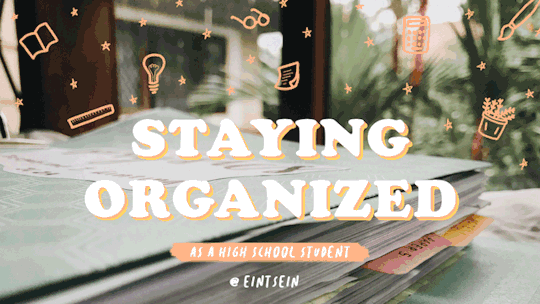
Hey guys, so I’m nearing the end of my senior year, and it’s been great so far! I accomplished my academic tasks efficiently and didn’t burn myself out, and I think the main contributor to my success as a student is my organization system. This system has been refined throughout my high school years, but I think now I’ve finally found the most effective methods.
Please remember that this isn’t the only organization system you can adopt; this is just the one that works the best for me, and I hope that by sharing it with you, you’ll gain a new perspective on how to stay organized as a high school student.

The first thing I wanna talk about is my notebook system, which I briefly mentioned in my Guide to Note-Taking.
My notebook system comprises three types of notebooks: the Everything Notebook, the subject notebook, and the revision notebook.
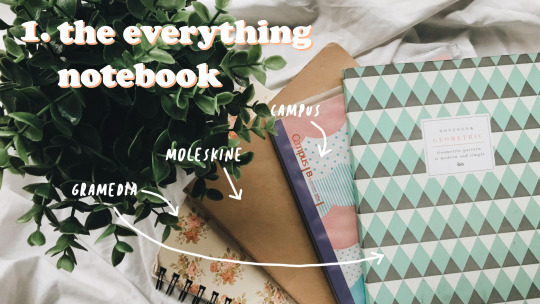
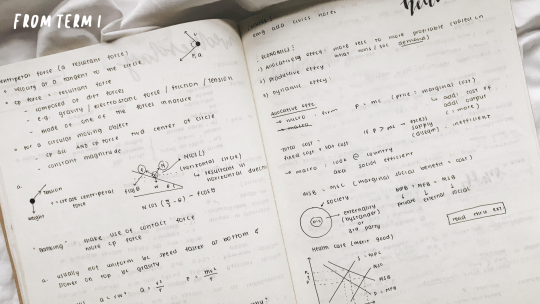
The Everything Notebook
The first stage is in-class notes. I only bring one notebook to school every day. I call it my Everything Notebook, and this is where I write down all of the notes I take in class. This way, I don’t have to lug around six notebooks where I’m only going to use a few pages in each of them that day.
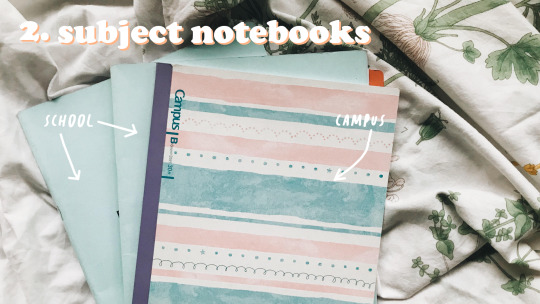
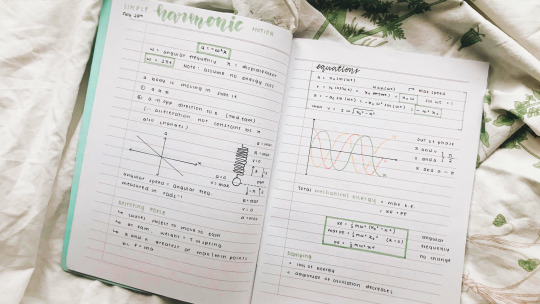
Subject Notebooks
At the end of the day, I would revise my notes and compare them to the syllabus so I know where we are in the learning process. I would then transfer my class notes from my Everything Notebook to my different subject notebooks. This is stage two. I also start to jazz up my notes because I use the notes in my subject notebooks to study for tests.
In addition to my class notes, I include material from my teachers’ notes that they might not have elaborated on, as well as points in the syllabus (I’m currently taking A2) that were only glazed over briefly, or not at all, in some cases. (Note: this does not mean they completely skip a chapter or topic; it’s more like they missed a few bullet points that should be in my notes but aren’t. An example would be if we’re learning about phenol reactions and the teacher forgot to mention the use of FeCl3 as a test for phenol.)
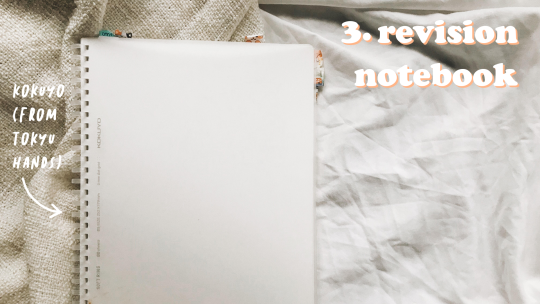
Revision Notebooks
Stage three comes a little later, when exam week is just around the corner. Essentially, I rewrite and improve my notes from my five different subject notebooks into a single revision notebook or binder. (Recently, I’ve opted for a revision notebook because they’re lighter and easier to carry around.)

Because my teachers don’t always teach in the order of the syllabus, the first thing I do is organize my notes according to the syllabus. I would then fill in any other missing gaps in the material that hadn’t been filled in stage two.
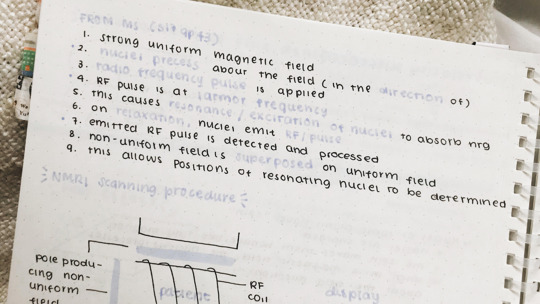
When compiling material for my revision notebook, I use as many sources as possible: my own notes, my teachers’ notes, youtube videos, online sites, and my favorite, the mark scheme! I add in some answers from past papers (explanations only, so no calculations) mainly to secure marks. It’s safer to memorize definitions straight from the mark scheme than from the textbook or from handouts. I also do this to ease my memorization, especially for topics that require lengthy explanations. It’s a lot easier to remember the 6 points I need to explain the principles of NMRI than to remember everything in the four-page handout my teacher gave me.

Folders and binders are essential to organizing your papers. Some people keep a single accordion folder for all their papers, but for me it’s just too heavy to carry around all the time. The same goes for subject folders that are brought to school every day.
Instead, my binder/folder system comprises my Everything Folder and my subject binders.
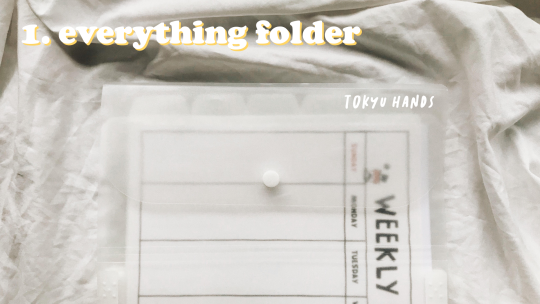
The Everything Folder
The folder I carry with me to school every day is this A4 folder I got from Tokyu Hands. It has 5 pockets, one for each day of the week, so all the papers I receive on Monday will go behind the first divider, and so on.
Some people also keep blank papers in their folders; I don’t because my school has its own lined paper and graphing pads that I keep under my desk that I use if a teacher asks us to do an assignment on those papers. If I do work at home, I prefer to just use a plain A4 paper or a legal pad.

Subject Binders
At the end of the week, I’ll sort my papers into my subject binders. Sometimes I’ll keep some papers in the folder if I think I’ll be needing it the next week. This usually only applies to worksheets because all my teachers’ notes are available on Google Classroom, so I can access them even if I don’t physically have them.
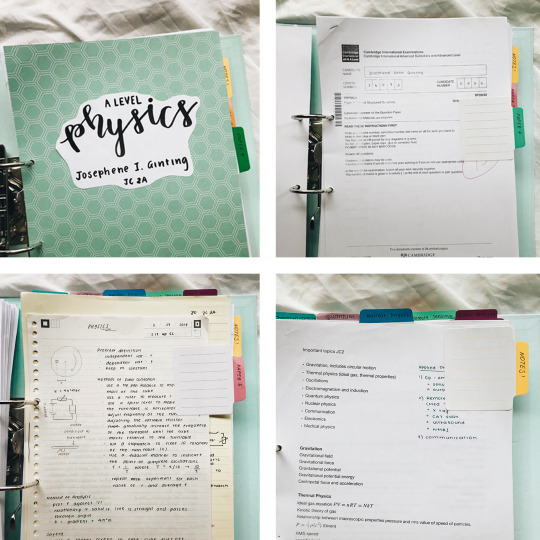
Each of these binders have sections inside them:
Physics: 1 for handouts, notes, and tests, 1 for Paper 4 (Theory), 1 for Paper 5 (Practical Planning). I included extra tabs to mark the different topics in the handouts section.
Chemistry: same as Physics.
Economics: 1 for Paper 3 (MCQ), 1 for Paper 4 (Case Study and Essay). A lot of my Economics material is online, though.
English: 1 for Paper 3 (Text and Discourse analysis), and 2 for Paper 4 (Language Topics, which includes 1 for Child Language Acquisition, 1 for World Englishes). Past papers, handouts, and notes all go under their respective topics.
Mathematics: I just keep everything together because I never revise math and just constantly do past papers.
This makes it easier for me to revise each subject because I can just take one binder with me instead of a messy folder with everything just shoved in there.

I keep a magazine file for each of my A-Level subjects (English and Mathematics are combined). All my textbooks, revision guides, and subject notebooks are kept here, so if I need to revise one subject, that’s the magazine file I’ll take out.
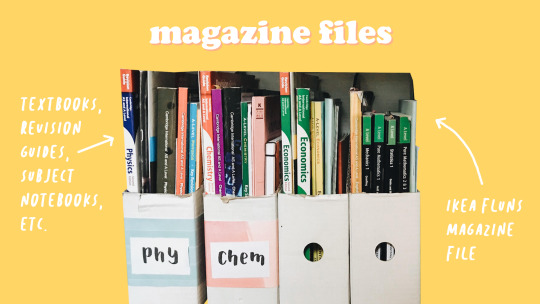
These magazine files prevent any small things (like my book of flashcards) from being shoved to the back of my bookshelf, or materials from different subjects from getting mixed up.

In my senior year, I mostly plan using this app called Edo Agenda. It syncs across all my devices for free and has all the features I need: a to do list to organize tasks, monthly and weekly calendars to organize events, a journal to organize notes and memos.
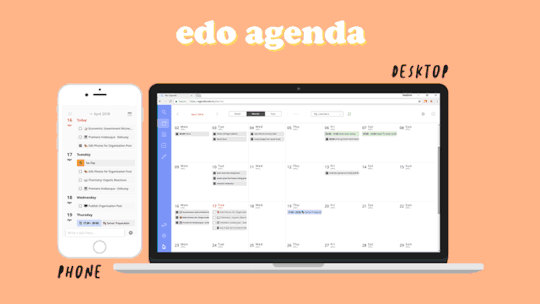
I used to bullet journal regularly, but it takes too much time during weekdays, so now I just bullet journal for the therapeutic effects it gives me, and I use an app for organizing tasks and events. Sometimes at the end of each week, I’ll transfer my tasks to my bullet journal and then decorate the page, but again, this is just for its therapy.

Organizing your school supplies is just as important as organizing your papers and notes. With a more organized backpack and pencil case, you won’t waste time looking for your things at the bottom of an abyss.
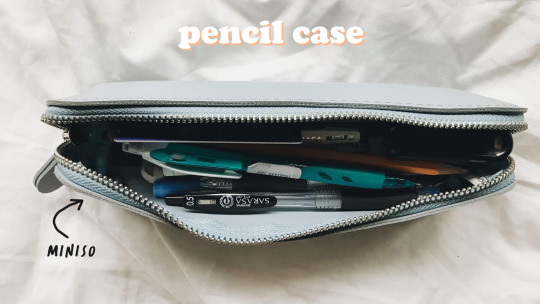
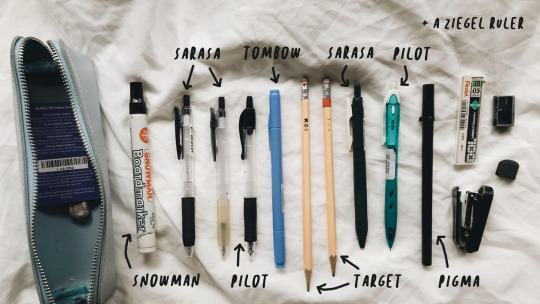
Pencil Case
I don’t find it necessary to bring so much stationery to school unless I plan on making notes at school (usually during revision week).
Backpack
Because we’re already in the revision term, I don’t really carry a lot of things in my everyday backpack, just the following:
Pencil case
Everything Notebook
Everything Folder
Revision notebook
Kindle
Phone
Wallet
Earphones
Calculator
Speaker
Drinking bottle
A pouch with things like a hairbrush, pads, and lip balm
And that’s all for now! I hope this post will help you organize your school life (if you haven’t already) or at least provide some useful insights on some ways to stay organized as a high school student.
45K notes
·
View notes
Photo

I saw a few masterposts going around tumblr and decided to make one. A lot of these links are helpful for High School as well! Enjoy and please tell me if you have problems with any link.
Blogs
onlinecounsellingcollege
fyeahcooldormrooms
freshmantips
theprospectblog
Studying
Flashcards
Calculators
Online Ruler
Thinking & Memorizing Tips
Research & Reading Tips
Finals Help Guide
Homework Help
Math Help
Geography Help
Study Playlist
Convert Anything To Anything
Productive Study Break Tips
Pull an All Nighter & Do Well On Your Exam
AP Cram Packets
Writing Help
Free Microsoft Word Equivalent
Writing Software Master post
Cant Remember A Word?
Bibliography Maker
Google Citations
Social Media Citation Guide
Earn A Cute Picture Of A Kitten For Writing
Writers Block?
Coffee Shop Sounds
Essay Structure Guide
Want To Know Who You Write Like?
Books
Alternatives To Expensive Textbooks
Download Free Books
Download Free Kindle Books
Free Audio Books
Sad/Stressed
Thoughts Room
Panic & Anxiety Masterpost
Guided Relaxation
Stress Relievers
Chill Playlist
Cute Videos
Food
Quick & Easy Snack Recipes
Study Snacks
On The Go Breakfast Recipes
Brownie In A Cup
Miscellaneous
Check The Safety Of Any Website
Download From 8tracks
Is This Website Down For Me Or Everyone?
Self Defense Tips
Upload Anything From Your Smartphone To You Laptop
Chrome Extension Tells You Which Tab Is Playing Music
Prevent Hangovers
Netflix Recommendations
Becoming An Adult Masterpost
All The Audios You’ve Ever Reblogged
Stream/Watch Free TV/Movies
Never Hit A Dead End With A Broken Link
Downloadable PDF To-Do Lists
Watch Musicals
List Of Universities On Tumblr
184K notes
·
View notes
Text
101 Study Tips
Take advantage of that lower workload in between exam periods to make good notes, clean your house, get work experience and do the things then rather than when you’re busier
Use Highlighters instead of pens to save time. Or vice versa depending on you
Change the timing in the pomodoro technique to suit you rather than the other way round
Use a planner to
Work out what time of day you study best. You could get up and study in the morning if you’re that sort of person
Attend your tutor or form sessions. Even if you don’t do much in them, you can
Keep your planner small and carry it everywhere
Even better, put your planner on your phone
Don’t sulk if you fail, look back at why you failed and try to improve
If you get distracted by wanting to do something when you should be focusing, write it down. It gives you a checklist of things to do later
Do these things on the checklist in your study breaks
Answer questions without your teaching asking you to
Read about your subjects outside of your classes, especially in high school
Sit at the front of the class room
Don’t sit by yourself in class
Get an early nights sleep
Or at least use sleepytime to get a good time frame
On school days when you wake up, get up straight away, it stops you lazing about
Work hard from the start of the year. There isn’t a time to slack off
Try spaced repititon for learning key facts or a revision schedule
Have snacks and a drink during study sessions. Preferably water.
Summarise and make all your notes onto smaller bits of paper for revision, it helps you cognise what the important facts are
To avoid study stress, take breaks and avoid studying for more than two hours a day
It’s also good to have a day where you don’t study at all once a week
Don’t schedule too far in advance, you’ll just get busy in the meantime or change your methods
When you’re feeling too stressed to work properly but not studying stresses you out, do easier tasks like reviewing flashcards or watching videos on your course
Do as much of your work in school as possible
Prioritise your classes. Especially if you have loads
Make any big habit changes you’ve been thinking of at the start of a term or new year
Study a little before bed, you’ve probably seen that study that says you remember more just before bed
Only make flashcards of the things that you don’t get or are important, not everything
Use online sites like Brainscape, Memrise, Anki or Quizlet for flashcards between devices
Print off your powerpoint slides before a lesson
If you can’t do that, read ahead in the textbook
The syllabus is your guide, so use that as a framework for your revision notes
Your stress and nerves are normal, don’t worry
Aim to finish your revision a week before your exams, it makes you start earlier and finish earlier, you also can rest before your exam
When you pick your subjects, choose the subjects you love
Don’t drink alcohol when you’re studying or any type of drug
Don’t listen to how much everyone is studying. A lot of people big it up or say they do none, usually both aren’t being truthful
Take messy notes in class and neaten them up later
Or take your notes online or on a computer
Have a folder to put your loose sheets and handouts in
Keep your to do list and schedule all in one place, whether that’s a book, app or phone
If you fall behind or are ill a lot, your classmates are your friends for a realistic description of what you’ve missed
When at school, know all the places you’d like to study in case one of them is busy
Don’t work in your bed if it makes you tired
Or work in your bed if all your seats are uncomfortable and it’s distracting
Don’t have too much coffee! And energy drinks are just terrible for you so maybe not have those either
You don’t have to be truthful to your actual opinion in essays, just go for what option has the most points
Listen to your teacher
Have your window open, the fresh air helps
Use practice papers and questions, they really help
Try to teach others as well or if you can’t, explain it in your own words to yourself
Combine more than one technique, so that the weaknesses of each method gets covered by another
Seriously just listen to your teachers
Check your emails every day
Set realistic goals and try not to be too harsh and unrealistic about the time you’ll spend achieving these as well
Use loud and annoying alarms to get you to do things
If you have to read, read out loud rather than in your head
Use a hair tie if you have long hair to keep it out of your face
Keep clean and get dressed for studying
Don’t waste your term making your notes pretty, if it helps, make sure the benefits outweigh the time problems
Study when you can. Don’t study if you’re too exhausted to do so.
Keep your desk as clean as you can
Know your sources of motivation. Possibly find a way to put that in your study space.
Attend as many classes as possible and don’t skip
Keep yourself busy with stuff that isn’t studying
Reward yourself for your hard work
Before you go back to school, start to wake up earlier so you’re ready
Wear comfortable clothes to school
Or wear whatever makes you feel good, feeling bad can be pretty distracting
Always think about the next step early, whether thats getting work experience, choosing subjects, finding a job or picking a thesis
Always eat breakfast
And always eat lunch too! Especially at school
Do whatever is best for you. Don’t follow a studyblr trend, do what’s best for you.
Make your studying a habit. Do it nearly every day for a long time and it’ll begin to feel more like second nature
Get to know your teachers if you can
And don’t be afraid to ask them for help outside of a lesson, either by email or afterwards, it helps a lot
Look at the types of questions you often get wrong as well as the topics you keep missing out on
Keep a spare bit of food in your bag, I usually have some sesame snaps in my bag as a small snack so I don’t have to get up to get food
Make productive friends and people with similar goals to you
When revising, revise everything and then focus on your weak points
Don’t spend too long on tumblr, and if you are right now, then this is your reminder to log off!
Don’t panic when you don’t know all the answers in a test, do you really need 100%?
Break your studying into smaller bits and spread it out over time to avoid headaches, burnout and all the problems that come with it
Eat better. Get enough fruit and vegetables
Don’t forget about Protein, from meats, nuts, etc. it helps a lot
If you’re falling asleep in class, I usually drink water, pinch myself, take lots of notes and fidget to keep myself up
Regularly clear out your bag, because a lot of stuff builds up
If you’re a more artistic person, use drawings like visual notes, mindmaps, timelines and literal drawings to help you study
If you study with a friend, quiz each other
Study on public transport if you can, notes and flashcards on phones are good for this
Don’t neglect any of your subjects, make sure they all get some time spent on them
Also focus beyond your first exam, it’s easy to overprepare for the first test and then not be ready for the rest
When taking a test look through it quickly before hand
Remember you don’t have to take the test in order
Review your notes all the time, review helps the memory
If you want to pull an all-nighter see if you can do it in the morning or day instead, and don’t do it the night before anything important
Always look at the details, especially if you get a mark-scheme or guide for your assignments
Constantly be taking on new improvements and trying to improve your methods
39K notes
·
View notes
Text

Studying while in emerg at the hospital
I think I’ve reached my peak, but what can I do? The midterm is tomorrow ¯\_(ツ)_/¯
#art school#art student#ocadu#ocaduniversity#study blog#study motivation#studyblr#studygram#studyinspo#studyspiration
2 notes
·
View notes
Text
101 Study Tips
Take advantage of that lower workload in between exam periods to make good notes, clean your house, get work experience and do the things then rather than when you’re busier
Use Highlighters instead of pens to save time. Or vice versa depending on you
Change the timing in the pomodoro technique to suit you rather than the other way round
Use a planner to
Work out what time of day you study best. You could get up and study in the morning if you’re that sort of person
Attend your tutor or form sessions. Even if you don’t do much in them, you can
Keep your planner small and carry it everywhere
Even better, put your planner on your phone
Don’t sulk if you fail, look back at why you failed and try to improve
If you get distracted by wanting to do something when you should be focusing, write it down. It gives you a checklist of things to do later
Do these things on the checklist in your study breaks
Answer questions without your teaching asking you to
Read about your subjects outside of your classes, especially in high school
Sit at the front of the class room
Don’t sit by yourself in class
Get an early nights sleep
Or at least use sleepytime to get a good time frame
On school days when you wake up, get up straight away, it stops you lazing about
Work hard from the start of the year. There isn’t a time to slack off
Try spaced repititon for learning key facts or a revision schedule
Have snacks and a drink during study sessions. Preferably water.
Summarise and make all your notes onto smaller bits of paper for revision, it helps you cognise what the important facts are
To avoid study stress, take breaks and avoid studying for more than two hours a day
It’s also good to have a day where you don’t study at all once a week
Don’t schedule too far in advance, you’ll just get busy in the meantime or change your methods
When you’re feeling too stressed to work properly but not studying stresses you out, do easier tasks like reviewing flashcards or watching videos on your course
Do as much of your work in school as possible
Prioritise your classes. Especially if you have loads
Make any big habit changes you’ve been thinking of at the start of a term or new year
Study a little before bed, you’ve probably seen that study that says you remember more just before bed
Only make flashcards of the things that you don’t get or are important, not everything
Use online sites like Brainscape, Memrise, Anki or Quizlet for flashcards between devices
Print off your powerpoint slides before a lesson
If you can’t do that, read ahead in the textbook
The syllabus is your guide, so use that as a framework for your revision notes
Your stress and nerves are normal, don’t worry
Aim to finish your revision a week before your exams, it makes you start earlier and finish earlier, you also can rest before your exam
When you pick your subjects, choose the subjects you love
Don’t drink alcohol when you’re studying or any type of drug
Don’t listen to how much everyone is studying. A lot of people big it up or say they do none, usually both aren’t being truthful
Take messy notes in class and neaten them up later
Or take your notes online or on a computer
Have a folder to put your loose sheets and handouts in
Keep your to do list and schedule all in one place, whether that’s a book, app or phone
If you fall behind or are ill a lot, your classmates are your friends for a realistic description of what you’ve missed
When at school, know all the places you’d like to study in case one of them is busy
Don’t work in your bed if it makes you tired
Or work in your bed if all your seats are uncomfortable and it’s distracting
Don’t have too much coffee! And energy drinks are just terrible for you so maybe not have those either
You don’t have to be truthful to your actual opinion in essays, just go for what option has the most points
Listen to your teacher
Have your window open, the fresh air helps
Use practice papers and questions, they really help
Try to teach others as well or if you can’t, explain it in your own words to yourself
Combine more than one technique, so that the weaknesses of each method gets covered by another
Seriously just listen to your teachers
Check your emails every day
Set realistic goals and try not to be too harsh and unrealistic about the time you’ll spend achieving these as well
Use loud and annoying alarms to get you to do things
If you have to read, read out loud rather than in your head
Use a hair tie if you have long hair to keep it out of your face
Keep clean and get dressed for studying
Don’t waste your term making your notes pretty, if it helps, make sure the benefits outweigh the time problems
Study when you can. Don’t study if you’re too exhausted to do so.
Keep your desk as clean as you can
Know your sources of motivation. Possibly find a way to put that in your study space.
Attend as many classes as possible and don’t skip
Keep yourself busy with stuff that isn’t studying
Reward yourself for your hard work
Before you go back to school, start to wake up earlier so you’re ready
Wear comfortable clothes to school
Or wear whatever makes you feel good, feeling bad can be pretty distracting
Always think about the next step early, whether thats getting work experience, choosing subjects, finding a job or picking a thesis
Always eat breakfast
And always eat lunch too! Especially at school
Do whatever is best for you. Don’t follow a studyblr trend, do what’s best for you.
Make your studying a habit. Do it nearly every day for a long time and it’ll begin to feel more like second nature
Get to know your teachers if you can
And don’t be afraid to ask them for help outside of a lesson, either by email or afterwards, it helps a lot
Look at the types of questions you often get wrong as well as the topics you keep missing out on
Keep a spare bit of food in your bag, I usually have some sesame snaps in my bag as a small snack so I don’t have to get up to get food
Make productive friends and people with similar goals to you
When revising, revise everything and then focus on your weak points
Don’t spend too long on tumblr, and if you are right now, then this is your reminder to log off!
Don’t panic when you don’t know all the answers in a test, do you really need 100%?
Break your studying into smaller bits and spread it out over time to avoid headaches, burnout and all the problems that come with it
Eat better. Get enough fruit and vegetables
Don’t forget about Protein, from meats, nuts, etc. it helps a lot
If you’re falling asleep in class, I usually drink water, pinch myself, take lots of notes and fidget to keep myself up
Regularly clear out your bag, because a lot of stuff builds up
If you’re a more artistic person, use drawings like visual notes, mindmaps, timelines and literal drawings to help you study
If you study with a friend, quiz each other
Study on public transport if you can, notes and flashcards on phones are good for this
Don’t neglect any of your subjects, make sure they all get some time spent on them
Also focus beyond your first exam, it’s easy to overprepare for the first test and then not be ready for the rest
When taking a test look through it quickly before hand
Remember you don’t have to take the test in order
Review your notes all the time, review helps the memory
If you want to pull an all-nighter see if you can do it in the morning or day instead, and don’t do it the night before anything important
Always look at the details, especially if you get a mark-scheme or guide for your assignments
Constantly be taking on new improvements and trying to improve your methods
39K notes
·
View notes
Photo
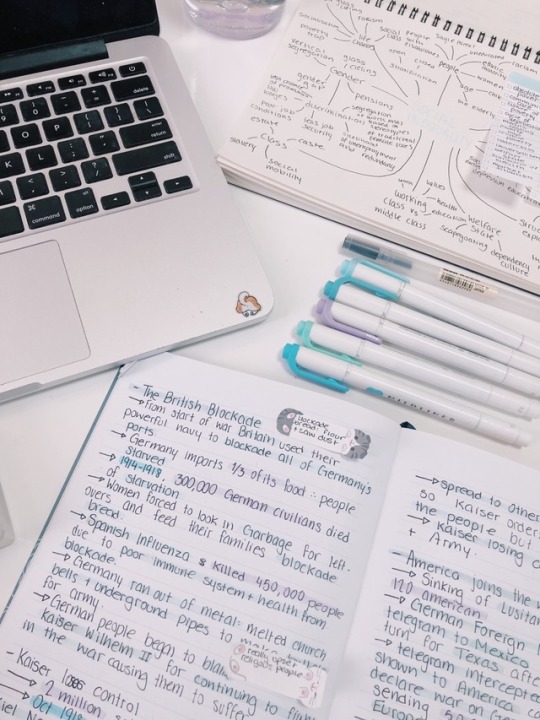

some of my history notes! i’m obsessed with these cat page flags/ sticky notes.
• Song of the day: Airplane by IKON •
3K notes
·
View notes
Text
How to study with a chronic illness and not kill yourself in the attempt

Hello my dear spoonies! It’s been a while since the last time I wrote, I’ve been busy dying and not-dying lately, but I am so much better now! *cries in fetal position*
I have so much to tell you, but today I want to focus on study issues. I have not been to attend college for eight months now because of my illnesses, but tomorrow I’m going to start a new semester. I’m obviously very scared, when you don’t study for so long because you weren’t healthy enought makes you feel worried, you’re afraid of becoming sicker and having to quit again.
But I made a little guide for myself so as to prevent this from happening. I want to share it as it may help someone.
Before I start I want to clarify that I have endometriosis, several spinal problems that make my joints hurt a lot and my gastrointestinal system doesn’t know how to function. Seriously. So what has been useful to me may or may not help you. Some may need more, some may need less. But I will try to make this as general as possible, hopefully something could be useful to you!
Don’t leave home without having breakfast.
By this I don’t mean that you have to eat three loaves, six eggs and a liter of coffee, eat something that makes you feel safe, eat something that you know your body can tolerate well. Leaving home without eating anything is going to make you have low blood sugar and will lower your blood pressure if you are susceptible to this. If you don’t feel well enough for breakfast, try having healthy snacks during class time.
Make good use of class time.
When you go back to your house you may need to rest a lot. Some will be able to take more advantage of the rest of the day than others, but if you know beforehand that you wont be able to, use your time in class well and don’t get zoned. If the class is slow you can try to advance on the material. Do not forget to keep a good posture while sitting.
Squeeze every second you feel good.

Rest in the recess.
Some class breaks are longer than others. The important thing is that you use this time to give your body or brain a break. If you need to close your eyes for a while, do it, if you need to stay in the classroom seated, do it. If they don’t let you stay in the classroom, talk to the teachers, don’t be embarrassed to explain your situation.
If you have spinal problems, use this time to get up and walk a little. The vertebral discs get compressed when seated and they rise when we return to stretch. This will avoid back pain and even some joints pain. Keep a good posture while sitting!!
Bring your meds.
If you need to take medicine, take them. If you need your painkillers, take them. It’s not a shame to take pills in front of others, you know your body and what you need, and your health comes first. Don’t think what others will say, you don’t need it and will only generate anxiety. If you are embarrassed that someone might ask, you can literally answer that you don’t want to talk about it, but that your medicines make you feel good. Your health is only your business.
Stay hydrated.
This speaks for itself. Drink lots of water! Especially if you drink a lot of coffee like me. Oh, and avoid the energy drinks.
Relax when you get home.
You do not have to go back and immediately sit down to study while you choke on lunch/dinner (haha, choke, sorry I’m five). Take a bath, put on comfortable clothes, do your back exercises if you have to, rest for a while in bed and apply hot or cold pads where it hurts if needed. If you’ve been sitting in class for a long time, I seriously recommend to do a little stretch for your back when you get home, it can make a difference (do it or I will kick you ಠ_ಠ).

Study time.
Understand that there are different ways to study and that you have to find the most suitable for you. For example, for some it will be better to take the reading material to bed and read lying down, and this is ok. Always make sure you are comfortable, and if you are sitting keep a good posture ( ͡° ͜ʖ ͡°).
Use ranges of 20/10 or 40/20 minutes, study, rest. Do not overload yourself, but try to keep up with the class. This will be very useful for when you need to take a day off or during finals. Studying a little every day is going to be a lot healthier for you, and less stressful, than doing it all in a week.
Do not forget that there are many resources, not just books. If you don’t feel well to read or do exercises you can watch educational videos while you rest your body. Read things to understand not to memorize. Use colors to make it easier for you to remember information. If you feel stuck in one chapter, move on to the next or review the previous one. Don’t stress or compare yourself to anyone. If a subject is difficult for you, you aren’t stupid, it’s only a subject that is more difficult to you, as it happens to everyone. It’s okay to ask for help.
Know when to stop.

This I think is the most important part. Recognize when you feel bad. Take a day off if you’re sick, it’s okay to skip a class. Don’t compete with others or compare yourself, your situation is different. Identify how much you can do, recognize it. Don’t think that your old self could have taken five classes and today you can only take three, two or one. Your past self is in the past. Work with who you are today and move on from there. If you can only take one class today, that’s fine. Time will go on the same, whether you do that subject or not. Don’t give up just because you have to take it slow, feel proud that you are strong enough to be where you are today.
You are valuable, you are intelligent and you will be a great professional.
┬┴┬┴┤ ͜ʖ ͡°) ├┬┴┬┴ And if you don’t strecht I will hunt you down.
1K notes
·
View notes

